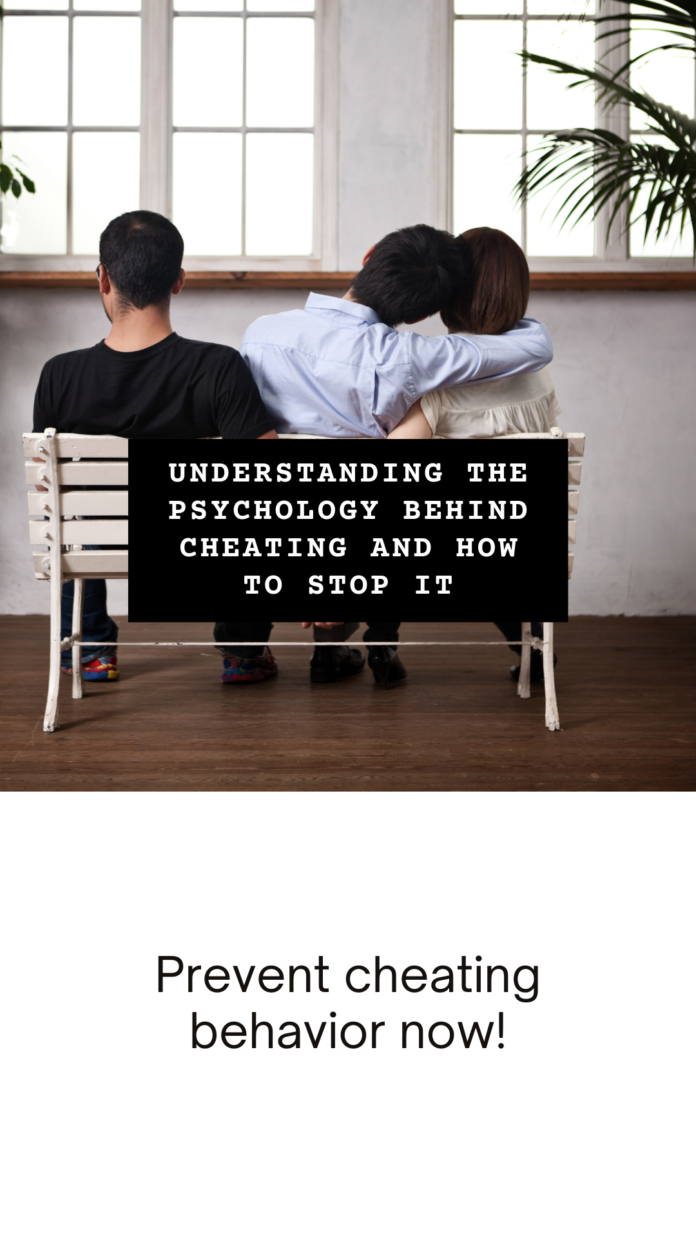Last Updated on May 3, 2024 by Silvy
Understanding the Psychology Behind Cheating and How to Stop It
Let’s face it, infidelity is a messy business. It shatters trust, rips apart relationships, and leaves a wake of emotional turmoil.
But beneath the surface of anger and betrayal lies a complex web of psychological motivations. Why do people cheat, even when they seemingly have a good thing going?
Unraveling the reasons behind infidelity can be a powerful tool for both those who may be tempted to stray and those seeking to strengthen their bonds.
In this comprehensive guide, we’ll delve into the fascinating psychology of cheating, exploring the emotional triggers, personality traits, and relationship dynamics that can contribute to this betrayal.
We’ll also equip you with practical strategies to fortify your relationship and steer clear of infidelity’s pitfalls.
So, grab a cup of coffee, settle in, and get ready to embark on a journey of understanding, self-reflection, and relationship resilience.
Why Does Cheating Happen? Unveiling the Motivations
There’s no single reason why people cheat. It’s often a cocktail of unmet needs, emotional dissatisfaction, and situational pressures.
Let’s explore some of the key psychological drivers:
- Dissatisfaction in the Relationship: This is a big one. When a relationship lacks intimacy, emotional connection, or physical fulfillment, individuals may seek these elements outside the partnership.
- Desire for Novelty and Excitement: The thrill of the chase and the allure of something new can be intoxicating, especially if the relationship has settled into a comfortable, yet potentially monotonous, routine.
- Low Self-Esteem and Validation Seeking: Some individuals with shaky self-worth might use affairs to bolster their ego and feel desired.
- Opportunity Makes the Thief: Sometimes, infidelity happens because temptation presents itself in a vulnerable moment. Think work conferences with open bars or reconnecting with an old flame on social media.
- Narcissistic Tendencies: Individuals with a narcissistic personality disorder may have a distorted sense of entitlement and lack empathy, making them more prone to infidelity.
- Commitment Issues: People with a fear of intimacy or commitment might use cheating as a way to sabotage a relationship before it gets serious.
Beyond the Individual: The Role of Relationship Dynamics
While individual psychology plays a significant role, the dynamics within a relationship also contribute to the likelihood of cheating.
Here are some factors to consider:
- Communication Breakdown: Ineffective communication can lead to misunderstandings, resentment, and a feeling of being unheard. This creates fertile ground for seeking connection elsewhere.
- Lack of Quality Time: Couples who prioritize work or other commitments over spending quality time together risk emotional disconnection, making them vulnerable to external validation.
- Unrealistic Expectations: Holding onto unrealistic expectations about relationships can lead to disappointment and a constant sense of something missing.
- Unresolved Conflicts: Sweeping issues under the rug instead of addressing them head-on can create tension and distance.
Building a Fortress of Fidelity: Strategies to Strengthen Your Relationship
Understanding the motivations behind cheating is just the first step.
Now, let’s empower ourselves with proactive strategies to build a strong and resilient relationship:
- Prioritize Communication: Open, honest, and regular communication is the cornerstone of any healthy relationship. Make time for meaningful conversations, express your needs and desires clearly, and actively listen to your partner.
- Cultivate Emotional Intimacy: Go beyond the surface level. Share your hopes, dreams, fears, and vulnerabilities with your partner. Make each other feel safe, loved, and understood.
- Rekindle the Flame: Don’t let the spark fade! Keep the romance alive by planning date nights, trying new things together, and maintaining physical intimacy.
- Practice Appreciation: Express gratitude for your partner. Let them know how much they are valued and appreciated through words and actions.
- Address Conflicts Constructively: Disagreements are inevitable, but how you handle them matters. Learn to communicate your needs assertively, listen respectfully, and work towards solutions together.
- Commit to Personal Growth: Relationships are a constant journey of growth. Work on yourself individually, address personal insecurities, and strive to be the best version of yourself for your partner.
- Seek Professional Help: If you’re struggling with communication issues, unresolved conflicts, or a lack of intimacy, consider seeking professional help from a couples therapist. They can provide valuable tools and guidance to navigate challenges and strengthen your bond.
Remember: Infidelity is a complex issue, and there’s no one-size-fits-all solution. If you’ve been struggling with the temptation to cheat, or suspect your partner might be straying, here are some crucial steps:
- Be Honest with Yourself: Dig deep and explore the reasons behind your feelings. Could it be a sign of deeper issues in the relationship?
- Communicate Openly: Honesty is key. Talk to your partner about your feelings and concerns.
- Seek Professional Help: A therapist can provide a safe space to unpack issues, rebuild trust, and explore options for moving forward, whether that be reconciliation or separation.

When Forgiveness Seems Impossible: Healing After Infidelity
The aftermath of infidelity can be devastating. Rebuilding trust takes time, effort, and a genuine commitment from both partners.
Here are some tips for navigating the healing process:
- Allow Yourself to Feel: It’s normal to experience a roller coaster of emotions – anger, sadness, betrayal. Don’t bottle up your feelings.
- Seek Individual Therapy: Individual therapy can help you process your emotions and rebuild your self-esteem.
- Establish Clear Boundaries: If you’re considering reconciliation, set clear boundaries and expectations for rebuilding trust.
- Focus on Forgiveness: Forgiveness isn’t for the other person; it’s for you. Letting go of resentment can be a powerful step towards healing.
- Decide What’s Right for You: There’s no right or wrong answer. Only you can decide whether reconciliation is possible or if it’s time to move on.
Remember, healing is a journey, not a destination. Be patient with yourself and your partner, and seek support if needed.
FAQs
Is cheating always a dealbreaker?
There’s no simple answer. The severity of the betrayal, the reasons behind it, and the willingness of both partners to work on the relationship all play a role. Open communication and couples therapy can help you decide if reconciliation is possible.
How can I rebuild trust after infidelity?
Rebuilding trust takes time and consistent effort. Be transparent, honest, and accountable for your actions. Give your partner space and time to heal.
Can a relationship recover from infidelity?
Absolutely! Many couples have successfully rebuilt trust and emerged stronger after infidelity. However, it requires genuine remorse, a commitment to open communication, and a willingness to address the underlying issues that led to the betrayal. Couples therapy can be a valuable resource in this process.
How can I prevent cheating in my relationship?
While there’s no guaranteed way to prevent infidelity, proactive measures can significantly reduce the risk. Prioritize open communication, cultivate emotional intimacy, keep the romance alive, and address conflicts constructively. Remember, a healthy relationship is built on mutual respect, trust, and a commitment to each other’s growth.
What if my partner refuses to admit to cheating or is unwilling to work on the relationship?
If your partner is in denial or unwilling to put in the effort to repair the damage, it might be time to consider separation. You deserve to be in a relationship where your needs are met, and trust is respected. Seek support from friends, family, or a therapist as you navigate this difficult decision.

Conclusion: The Power of Honesty, Communication, and Commitment
Understanding the complex psychology behind cheating empowers us to build stronger, more resilient relationships.
By prioritizing open communication, cultivating emotional intimacy, and addressing issues head-on, we can create a foundation of trust and respect that minimizes the risk of infidelity.
Remember, a healthy relationship is an ongoing journey of growth and commitment. Invest time and effort, nurture the connection, and weather the storms together.
For further reading, here are some credible sources:
- American Psychological Association: https://www.brides.com/why-do-people-cheat-5112047
- The Gottman Institute: https://www.gottman.com/
- HelpGuide.org: https://www.marriage.com/advice/relationship/30-experts-explain-reasons-why-men-indulge-in-cheating/
Remember, you are not alone. If you’re struggling with infidelity in your relationship, there is help available. Reach out to a therapist or counselor for guidance and support.



